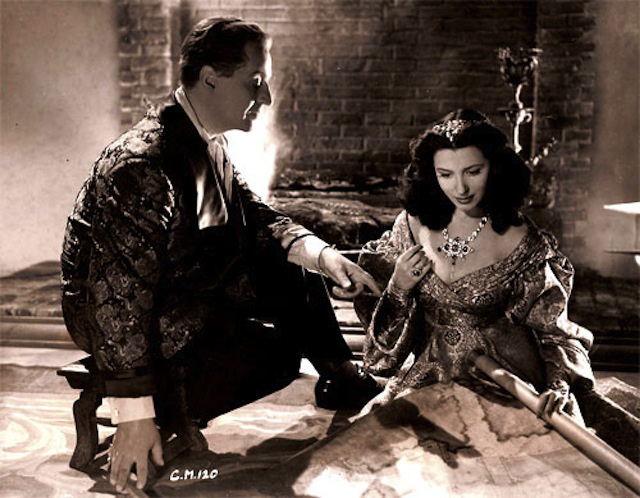Corridor of Mirrors begins with a respectable British housewife sneaking out of the house to see her lover—or rather, the wax figure of her lover in the Chamber of Horrors at Madame Tussaud’s. FilmStruck was made for oddities like this. How else would I have found a film so nonchalantly bizarre, so casually baroque?
The housewife is one Mifanwy Conway (Edana Romney), settled into suburban domesticity with an unremarkable husband and equally unremarkable children. Yet seven years before she led an entirely different life as the lover and muse of Paul Mangin (Eric Portman), a wealthy painter, critic and connoisseur. Their story unfolds in flashback. Mangin considers himself a man born after his time and holds the modern world at arm’s length, driving around town in a hansom cab, in defiance of cars, and living in a mansion decorated like a Renaissance palazzo. Mifanwy is a society girl and right up to date. Bored with the same old nightclubs and parties, she steps into Mangin’s world and is consumed by it—living out a fantasy shaped by his desires.
Their first meeting is rhapsodic. Mangin walks into a nightclub dressed like an Edwardian knut (tailcoat, white gloves and all) and Mifanwy, sitting with her usual crowd of Bright Young Things, mocks him. Then their eyes meet and she forgets how to blink, possibly even breathe. Impervious to gawking onlookers, Mangin crosses the room and sweeps her into a waltz. They dance in silence. His gaze is proprietary; she is transfixed.
Try as it might, the film never reaches these heights again.
That’s no fault of Mangin’s. With brooding eyes and air of melancholy, he acts like a holdover from an Ann Radcliffe novel, an aristocratic enigma. He woos Mifanwy first by making her wait: he vanishes after the waltz and doesn’t reappear for days. Next he chips away at her modish facade. “Everybody wants to belong to the future,” he tells her. “No one wants to belong to the past. Except me.” The future is a gamble, the past a certainty. Without realising it, Mifanwy longs for a world less ephemeral than her own and Mangin obliges, showering her with jewels and an endless supply of period costumes. She becomes his creation: a mannequin with no identity of her own. One evening he walks into a room to find a miniature Renaissance woman twirling on a music box and Mifanwy dancing beside it—the doll made flesh.
Mifanwy is the focal point of Mangin’s obsession but the film only comes to life around Portman. His is the only interesting performance. He was comfortable playing outsiders: the Nazi officer in 49th Parallel, the mystic in A Canterbury Tale, both for Powell and Pressburger. His intensity could be unnerving. It’s a sign of the peculiar esteem in which Portman was held by the British public that he ended up in the Chamber of Horrors twice in two years (first in Wanted for Murder).
In Corridor of Mirrors he holds the film together through sheer force of will. Eventually Mangin reveals his greatest secret: a portrait of a woman the exact double of Mifanwy, painted in the 15th century. Not only does he believe Mifanwy is the reincarnation of her doppelgänger, he also believes he was once her lover. Portman’s eyes blaze with other-worldly fire. If Mangin is mad, it’s madness with a terrifying certainty.
Besides Portman what distinguishes Corridor of Mirrors is its Gothic look. When Mifanwy wanders into the titular corridor in Mangin’s house, she finds a mannequin hidden behind each mirror—a chorus of silent women, all reflections of her. The film was Terence Young’s directorial debut but nothing in it hints at his later work, certainly not his Bond films (Dr. No, From Russia with Love, Thunderball) and not even the claustrophobic Wait Until Dark.
It’s a pity then that the film promises so much and delivers so little. Romney deserves much of the blame. She co-wrote the script, giving herself far too many lines, most of them florid narration. Worse, she quickly exhausts her range of available expressions, leaving the film to drift incoherently whenever Portman isn’t in sight. The whole production feels like a vanity project designed to launch her career. Instead, she was eclipsed by two of the bit players at Mifanwy’s nightclub table: Christopher Lee, making his film debut and Lois Maxwell, the future Ms. Moneypenny.
With Romney little more than a placeholder, Corridor of Mirrors eventually collapses, devolving into an exercise in style that merely flirts with madness before losing its nerve. As a portrait of a man consumed by his own delusions—as a showcase for Portman—it’s fascinating. As anything else, it’s a confused mess.

Leave a Reply